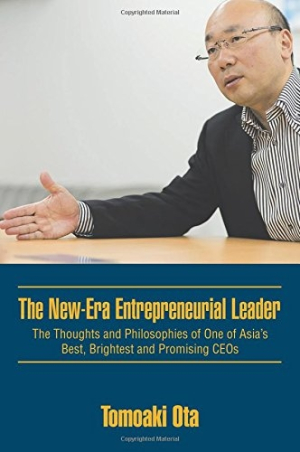The New-Era Entrepreneurial Leader
The Thoughts and Philosophies of One of Asia's Best, Brightest and Promising CEOs
Full of valuable lessons, this book should be savored by every business leader.
In The New-Era Entrepreneurial Leader, Tomoaki Ota offers a keen insider’s perspective on leading a manufacturing business.
Ota, the president of a Japanese specialty chemicals manufacturer, started his tenure just after the shock of the Lehman Brothers collapse and the massive Japanese earthquake and tsunami. As such, he encountered a situation for which, he writes, there was no “how-to manual. You have to rely on your basic beliefs, principles and philosophies.” In this short, engaging book, Ota shares how he overcame such adversity, as well as his thoughts on business leadership, in a candid and unassuming way.
Rather than set out a series of rules in structured fashion, the author weaves his own experiences and leadership style into an intimate narrative. He touches on a number of issues related to business management in a wide-ranging discussion that includes general leadership strategies, business succession, family business, company meetings, financial acumen, and globalization. Along the way, Ota is clear and decisive in his beliefs.
His “keys to success,” for example, are simply and directly stated: “Know your limits, trust your employees, delegate tasks and gain the trust and support of your employees.” He can also be a contrarian: Ota strains against the Japanese cultural characteristic of respecting seniors because, he writes, “we will lose the essence of current activities if we stick to this culture without noticing the changes in the paradigm.”
Two chapters in particular, “The Four ‘Don’ts’ of Success” and “Five Fatal Flaws to Avoid,” should prove especially enlightening to small business manufacturers. For example, Ota advises the leader of a smaller manufacturing firm with little capital to resist the urge to diversify and instead concentrate on becoming an expert in a specialized area. Similarly, he counsels against producing products overseas. While these recommendations may surprise some readers, the author puts forth a solid case for them.
Some of the concepts Ota explores do, in fact, challenge contemporary business thinking, such as his belief in “self contradiction.” This innovative approach to leadership is the notion that a business leader should proactively encourage “opposite opinions rather than linearly pursue sound arguments.”
It is the author’s ability to speak from a very personal perspective that makes this leadership book unique and compelling. Many of Ota’s comments are directed specifically to leaders of small and medium-sized Japanese manufacturing firms (the book was originally published in Japan), but his thoughtful observations and wisdom borne of experience can apply broadly.
Ota’s final bit of advice, not surprisingly, is steeped in Japanese philosophy. Japanese kanji characters have a stick in the middle, meaning “to take a correct action suitable to a situation.” As Ota points out, “It is important for business leaders to take actions rather than to facilitate discussions.” This, as well as the other valuable lessons in The New-Era Entrepreneurial Leader, should be savored by every business leader.
Reviewed by
Barry Silverstein
Disclosure: This article is not an endorsement, but a review. The publisher of this book provided free copies of the book and paid a small fee to have their book reviewed by a professional reviewer. Foreword Reviews and Clarion Reviews make no guarantee that the publisher will receive a positive review. Foreword Magazine, Inc. is disclosing this in accordance with the Federal Trade Commission’s 16 CFR, Part 255.

